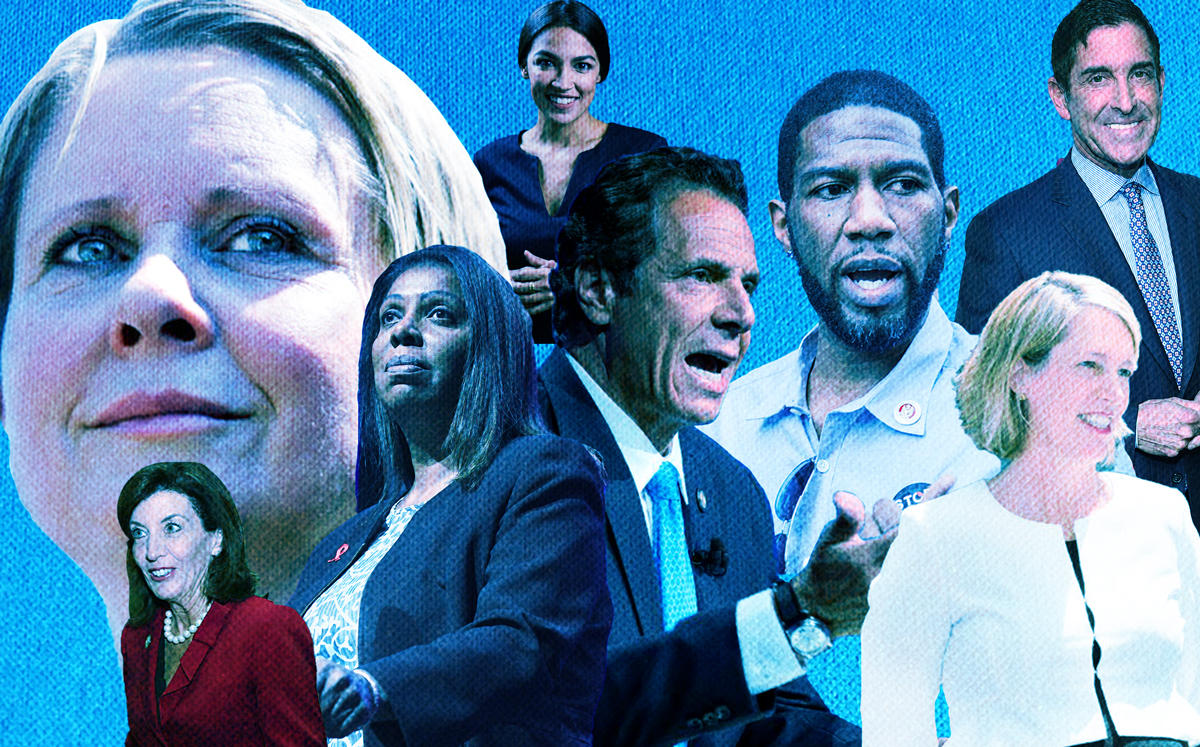Trending
Can NY politicians fight Big Real Estate?
State gears up for primaries on Thursday

In the debate between Cynthia Nixon and Andrew Cuomo last month, the discussion briefly turned to the issue of homelessness. Cuomo touted his career-long dedication to housing, beginning with a nonprofit he founded in the 1980s. Meanwhile, Nixon blamed the state’s housing crisis, in part, on the governor’s close ties with the real estate industry.
“I don’t think it’s any coincidence that we have one of the largest housing crises that we’ve ever seen in this state when the number one contributor to Andrew Cuomo is the real estate industry and corporate developers,” Nixon said.
In the lead up to Thursday’s primary, candidates for two crucial state offices — governor and attorney general — have taken aim at the real estate industry’s role in politics. Campaign contributions from the industry have loomed large in both races. For instance, Attorney General candidate Zephyr Teachout has refused donations from corporate developers, and Letitia James refunded a $10,000 campaign contribution from a controversial landlord. In the governor’s race, Nixon has criticized Cuomo’s top donors — which included more than $700,000 from real estate in the first half of 2018 — and called for dramatic housing reform, including universal rent control.
After the major upset delivered by Alexandria Ocasio-Cortez in June, victory for other upstart progressives against machine candidates seems far more attainable. Her win over Queens boss Joseph Crowley underlined the division in the Democratic party, but also demonstrated the power of tapping into new and disgruntled voters.
Those in the industry say that a recent surge in anti-developer rhetoric overstates the influence of real estate and fails to recognize the benefits that the private sector provides. Others say such criticism fails to go far enough and often doesn’t translate to much-needed action once the candidate takes office. What seems clear, however, is that in a city struggling to keep up with the need for affordable housing, politicians and residents will increasingly to look to the real estate industry as either the solution or the adversary to the problem.
“The reality is that most New Yorkers are spending a very large percent of their income on rent, so it’s certainly easy to vilify real estate developers,” said David Greenfield, former council member and land use committee chair. “Whereas seven years ago, the main talking point was Occupy Wall Street, it’s now Occupy Real Estate.”
State of affairs
Real estate’s played a big part in recent statewide campaigns for a few reasons. With a New York City developer in the White House, framing a campaign as a challenge to real estate’s clout — and potential abuse of power — is one way to establish progressive credentials. At the same time, the city is racing to build more affordable housing while also grappling with a scandal-ridden public housing authority.
RXR Realty’s Seth Pinsky said that the concerns raised by candidates should be a wakeup call for the real estate industry and the business community at large. He called the “demonization” of real estate unfair but said criticism is borne from issues that need to be addressed.
“I think that the challenges and frustrations that the candidates are addressing are real. There’s clearly an affordability problem in New York,” he said. “But it’s a supply and demand problem. It’s not a problem of greedy landlords or a problem that universal price control is going to fix.”
Nixon and her running mate, Jumaane Williams, have called for universal rent control, though how it would be implemented isn’t clear. During last month’s gubernatorial debate, Cuomo briefly floated the idea of raising the vacancy decontrol threshold, which is currently at $2,733.75 but hasn’t elaborated on the proposal.
“I do think history shows us that when people get into office, and they come to understand how complicated the problems really are, the reality of the situation often requires them to make adjustments,” Pinsky said.
Greenfield said there’s an inclination to oversimplify housing issues, referring to it as a “Trumpification of politics.”
“Real estate developers are not perfect, for sure, but at the same time, they’re not evil,” he said. “And it’s not so simple to put them in a box.”
Money talks
The past three years have thrown the influence of real estate in politics into sharp relief with the conviction of two of the most powerful men in Albany. Earlier this year former State Assembly speaker Sheldon Silver and former Senate majority leader Dean Skelos were both re-convicted on corruption charges. Both cases involved leveraging relationships with landlords and developers who, at the time, were lobbying the officials on issues important to the real estate industry, like the 421a tax break.
John Kaehny, executive director and a founding board member of good-government group Reinvent Albany, said given that the real estate industry was at the center of both scandals, there should be even more interest in how donations from real estate impacts elections. He said state elections are especially vulnerable because limited liability companies are treated as individuals rather than corporations. Until rules are reformed, real estate will continue to wield considerable sway over statewide elections, he said.
“This is really a basic matter of money versus people,” he said. “The LLC loophole and the fact that it essentially allows unlimited contributions, allows real estate executives to flex their muscles in extraordinary ways.”
LLCs have become a preferred vehicle for bypassing state campaign contribution rules, especially for real estate companies which often create LLCs for each new development. Under state law, individuals can donate up to $44,000 to candidates running for statewide office, while corporations are capped at $5,000. The state legislature has tried on at least three occasions to hold LLCs to the same restrictions as corporations.
“We’ve passed it in the assembly several times, and then, it goes nowhere,” said state Assemblyman Tom Abinanti, who has endorsed Nixon for governor. “It dies because it fails in the senate.”
As previously reported by The Real Deal, real estate donated more than $733,000 to Cuomo’s re-election campaign in the first half of 2018. His top donor during this timeframe was the Durst Organization, with $75,000 across four LLCs and James L. Nederlander of the Nederlander Organization with $65,000. Cuomo’s favored attorney general candidate, Public Advocate Letitia James, has raised over $280,000 from 80 real estate donors. But she’s also returned donations from certain landlords, including $10,000 from Joel Landau, whose firm Allure Group was at the center of the Rivington House scandal. Congressman Sean Patrick Maloney raised at least $433,000 in real estate contributions through the end of August. Teachout has touted the fact that she doesn’t take money from corporate developers and on her campaign website calls for a ramp-up in investigations into illegal tenant harassment, tax fraud and money laundering. She has, however, received $21,000 from multifamily landlord Arthur Cornfeld and L+M Development Partners’ Ron Moelis.
“Why has New York City real estate been able to be so dirty and so cruel for so long? The answer is developer money,” Teachout said during a press conference last month, according to Politico.
Her stance did not go unnoticed by the industry. In late August, Related Companies paid $100,000 to a political action committee that quickly spent the funds on a digital campaign that targeted Teachout, according to a report by Politico.
“The real estate industry is not monolithic. Like journalism and politics, it is not all good, or all bad and not the source of all society’s ills, no matter who says so,” said the Durst Organization’s Jordan Barowitz. “Difficult problems are complicated to solve and require thoughtful collaboration, because of this, scapegoating inevitably solves nothing.”
All politics are local
During his campaign for re-election last year, Mayor Bill de Blasio positioned himself as someone who will stand up against real estate interests. He held a press conference outside 432 Park Avenue to promote a “mansion tax” on sales of homes over $2 million. He told New York Magazine that if he could, he’d curb private property rights. At the same time, his affordable housing program depends on heavily on a buy-in from private developers. In August, the New York Post reported that de Blasio’s deputy mayors, commissioners and top aides took 136 meetings with lobbyists from March to May this year, most of which pertained to real estate and housing.
Ron Shiffman, a professor at Pratt Institute’s graduate planning program, noted that when he served on the city’s Planning Commission under Mayor David Dinkins, real estate professionals and their representatives made their presence known at meetings.
“Not only were they the major speakers, they were the major observers,” he said. “They were able to talk to the chair of the committee directly any time they wanted to. I’m not saying that there was anything underhanded, but their power was very, very much an influence.”
Council member Ben Kallos said that while he doesn’t actively seek donations from the real estate industry, he does work well with some developers. The key, he said, is to not build towers that are out of context with the neighborhood and run safe construction sites.
“I’m not actually anti-development,” he said. “If you agree to not be an asshole, you are going to be fine.”
Kallos, who in the past year waged a campaign against a high-rise condo planned on the Upper East Side, said many city officials speak out against developers but not everyone follows through.
“Real estate developers are forgiving of politicians who say what they need to to their constituencies, so long as it’s nothing more than words,” he said.




